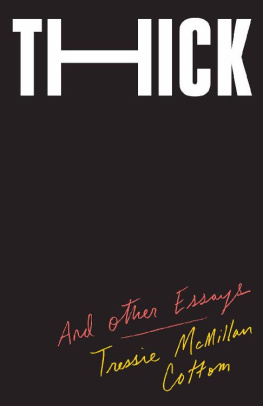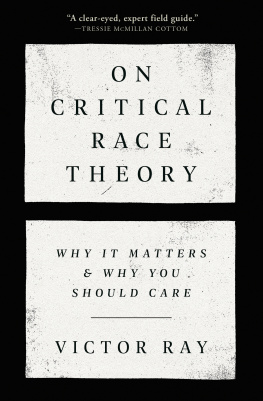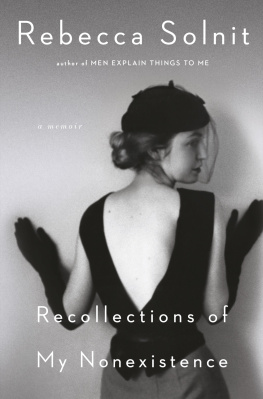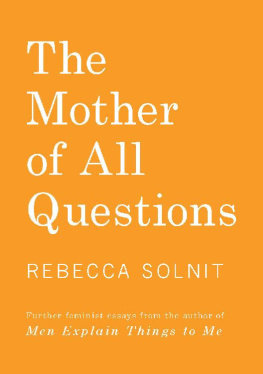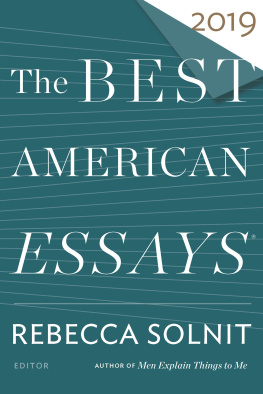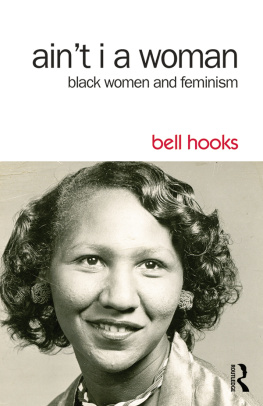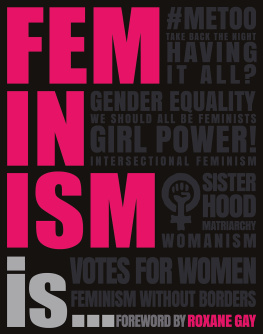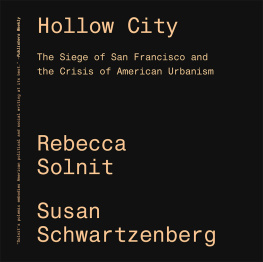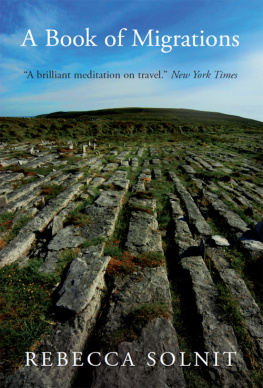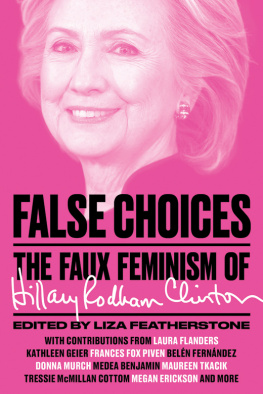THICK
Also by Tressie McMillan Cottom
Lower Ed: The Troubling Rise of For-Profit Colleges in the New Economy
For-Profit Universities: The Shifting Landscape of Marketized Higher Education
(co-editor with William A. Darity Jr.)
THICK
And Other Essays
TRESSIE McMILLAN COTTOM

2019 by Tressie McMillan Cottom
All rights reserved.
No part of this book may be reproduced, in any form, without written permission from the publisher.
Requests for permission to reproduce selections from this book should be mailed to: Permissions Department, The New Press, 120 Wall Street, 31st floor, New York, NY 10005.
Grateful acknowledgment is made to:
The Atlantic for permission to reprint The Problem with Obamas Faith in White People, 2016 by Tressie McMillan Cottom; the New York Times for permission to reprint How
We Make Black Girls Grow Up Too Fast, 2017 by Tressie McMillan Cottom; Warner Chappell Music, Inc. for permission to use lyrics from the song Thick & Pretty performed by Migos; Sony Music for permission to use lyrics from the song Mixd Girl performed by T-Pain; the Joy Harris Literary Agency, Inc. for permission to use lines from Those Who Love Us Never Leave Us Alone with Our Grief by Alice Walker, the foreword to Barracoon: The Story of the Last Black Cargo by Zora Neale Hurston (New York: Amistad, 2018), 2018 by Alice Walker; Curtis Brown, Ltd. for permission to use lines from the poem homage to my hips, copyright 1980 by Lucille Clifton. Now appears in The Collected Poems of Lucille Clifton 19652010 by Lucille Clifton, published by BOA Editions. Reprinted by permission of Curtis Brown, Ltd.
Published in the United States by The New Press, New York, 2019
Distributed by Two Rivers Distribution
ISBN 978-1-62097-436-0 (hc)
ISBN 978-1-62097-437-7 (ebook)
CIP data is available
The New Press publishes books that promote and enrich public discussion and understanding of the issues vital to our democracy and to a more equitable world. These books are made possible by the enthusiasm of our readers; the support of a committed group of donors, large and small; the collaboration of our many partners in the independent media and the not-for-profit sector; booksellers, who often hand-sell New Press books; librarians; and above all by our authors.
www.thenewpress.com
Book design and composition by Bookbright Media
This book was set in Goudy Oldstyle and Futura
Printed in the United States of America
2 4 6 8 10 9 7 5 3 1
For Gabrielle, always.
Life, inexhaustible, goes on. And we do too. Carrying our wounds and our medicines as we go. Ours is an amazing, a spectacular, journey in the Americas. It is so remarkable one can only be thankful for it, bizarre as that may sound.
Perhaps our planet is for learning to appreciate the extraordinary wonder of life that surrounds even our suffering, and to say Yes, if through the thickest of tears.
Alice Walker, from the foreword to Zora Neale
Hurstons Barracoon
CONTENTS
Thick
Thick ethnography provides readers with a proxy experience for living in another culture such that they engage with its richness, pick up the threads, and do what members dowhich is to generate new meanings from the same cultural repertoire.
Roger Gomm and Martyn Hammersley
Like my women (like what?)
Thick and pretty (pretty and thick)
Migos, Thick & Pretty
these hips are big hips
they need space to
move around in.
they dont fit into little
petty places. these hips
are free hips.
Lucille Clifton
I was pregnant at thirty. Divorced at thirty-one. Lost at thirty-two. How else would I have ended up in a place called Rudeans? Rudeans was an institution. It sat in a strip mall on a street, Beatties Ford Road, that had once been the heart of the new black middle class in Charlotte, North Carolina. As went the fortunes of black homeownership, entrepreneurship, wealth creation, citizenship, and health, so went Beatties Ford Road.
Rudeans held on. So did Rudean. The establishment was named for its owner even though it perhaps would have sounded better were it not. But I do not tell old black people nothing. It is rude. What wasnt rude was Rudeans reputation. You grew up on jokes about the old players and aging fly girls living out their glory days at Rudeans, the nightclub that also sold fried fish plates and chicken wings. You had to get there early because parking was slim pickings. And there were only maybe a dozen or so tables pressed up against a long wall on the empty side of the room. The other wall had the bar, wrapped in tufted pleather and papered with liquor ads featuring smiling, glorious black people living the high life.
You ordered your fish at the bar. If you were early enough you could eat it at a table as bodies pressed by you, inching in beat together. After you ate, if you were feeling extra festive, you slid through those bodies and an oddly narrow doorway into a second room in the back. Narrow like the front room but in the different direction, horizontal to the front rooms vertical, this was the dancefloor.
Going to Rudeans your first time was a rite of passage. In your teens you laughed at Rudeans. In your twenties you joked about sugar daddies at Rudeans. When you hit thirty, you busted your Rudeans cherry. On my first of only two visits to Rudeans, I sat alone at the bar waiting for friends as a man sidled up next to me. He talked, I mostly demurred and waited on my croaker plate, fried hard. Just before he asked me for my phone number he said, Your hair thick, your nose thick, your lips thick, all of you just thick.
It was true if not artfully stated. Being too much of one thing and not enough of another had been a recurring theme in my life. I was, like many young women, expected to be small so that boys could expand and white girls could shine. When I would not or could not shrink, people made sure that I knew I had erred. I was, like many black children, too much for white teachers and white classrooms and white study groups and white Girl Scout troops and so on. Thick where I should have been thin, more when I should have been less, a high school teacher nicknamed me Ms. Personality, and it did not feel like a superlative.
I had tried in different ways over the years to fit. I thought I could discipline my body and later my manners to take up less room. I was fine with that, but I learned that even I had limits whenin my pursuit of the life of the mindmy thinking was deemed too thick.
On one of my first forays into publishing anything, an editor told me that I was too readable to be academic, too deep to be popular, too country black to be literary, and too naive to show the rigor of my thinking in the complexity of my prose. I had wanted to create something meaningful that sounded not only like me, but like all of me. It was too thick.
Once I was at an academic conference. Well, I am at many academic conferences because I am an academic. But this conference stands out for the moment when a senior academic, a black woman, marched over to me and said without preamble, You need to stop writing so much. Theyre just using you.
At the time, I was just a graduate student. I was finishing my dissertation, but that was not exactly the point of contention. The real point of contention was that I was also one of the most published working sociologists in print and digital media. It was and still is a strange juxtaposition.
Graduate students are not people. In the academic hierarchy, graduate students are units of labor. They can be students, but not just students. They are academics in the making. They do not have any claim to authority among scholars. In fact, the most surefire way to get a real, minted academic to speak to you when you are just a graduate student is to introduce yourself by proxy: Hi I am Tressie, student of Richard Rubinson and Sandy Darity, and I know five other people who you recognize as people. It is hard to get that out in the three seconds humans generally give each other to establish small talk during routine social interactions. That is why you can, at almost any gathering of academics, find graduate students milling about in small packs, finishing sentences after someone who did this dance decades ago has already walked away.
Next page
